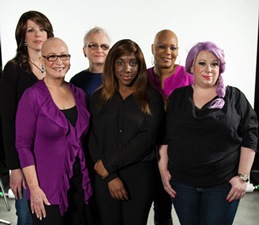 It was not so very long ago that lots of words we use freely today were taboo and people rarely said them easily: HIV, AIDS, transgender, colonoscopy, even the word cancer until First Lady Betty Ford spoke out about it candidly.
It was not so very long ago that lots of words we use freely today were taboo and people rarely said them easily: HIV, AIDS, transgender, colonoscopy, even the word cancer until First Lady Betty Ford spoke out about it candidly.
And yet it's still very hard for many women with alopecia areata to say the name of their own autoimmune disease. How can we change that?
A big step in that direction is helping women with alopecia understand they are not alone. That is why I started Bald Girls Do Lunch. So how do we break down the cloaks of secrecy encumbering too many women? How do we make it easier for women to help bring the words alopecia areata into everyday vocabulary?
What is Bald Girls Do Lunch?
We get people together at the same place and time. We don't have to call it therapy, nor are we old school and dredge up the depressing connotation of a support group. We do social and we do meaningful and we do women-centric fun. Just getting together, talking in a relaxed environment about what a day in the life is like for women with alopecia areata, really helps break down those walls we have built. We're not wishin' and hopin' for a magical cure either. At Bald Girls Do Lunch, we do what works.
How Can Talking About Alopecia Make a Difference?
One of the best examples I've seen of this recently was when we had women with alopecia areata of all ages and stages of hair loss gather for a video photo shoot near NYC. We asked them what the experience of the meeting was like. So not only did we get beautiful images of these women showing how normal they are (how they are your teacher, your nurse, your sister, mother or cousin). We also saw first hand how meaningful the experience of talking with other women with alopecia areata itself was.
We asked the women if they thought photos and videos of women with alopecia will help others who are still keeping their condition a secret. Their answers blew me away.
I believe that woman should embrace themselves. We are fearfully and wonderfully made and should embrace our individuality. If we feel awkward then other people will be awkward, therefore I say you should walk confidently with every step you take.
Confidence for women with alopecia can often be easier said than done, but it all starts with talking, meeting others, and knowing you are not alone!
I just read Dan Brown's Inferno where one of the main characters suffers from a form of alopcecia. She described in the book what it was like to loose her hair & finally shaving it. It was a brief description, yet I was glad that it was included in the story. I think that the more people know about alopecia the easier it will be from those of us who have it to reveal our condition.
Even something as small as a paragraph in a 500-page book can change your outlook, as well as the outlook of others who are not living with this disease every day.
I feel strongly that the more we talk about alopecia areata, especially describing what it is like to be a women with alopecia, the sooner alopecia will stop feeling taboo in our every day lives. It certainly can be difficult to talk about alopecia with strangers. That is why it can be helpful to first find women with alopecia in your area and gain some comfort in saying the word and sharing your ideas.

